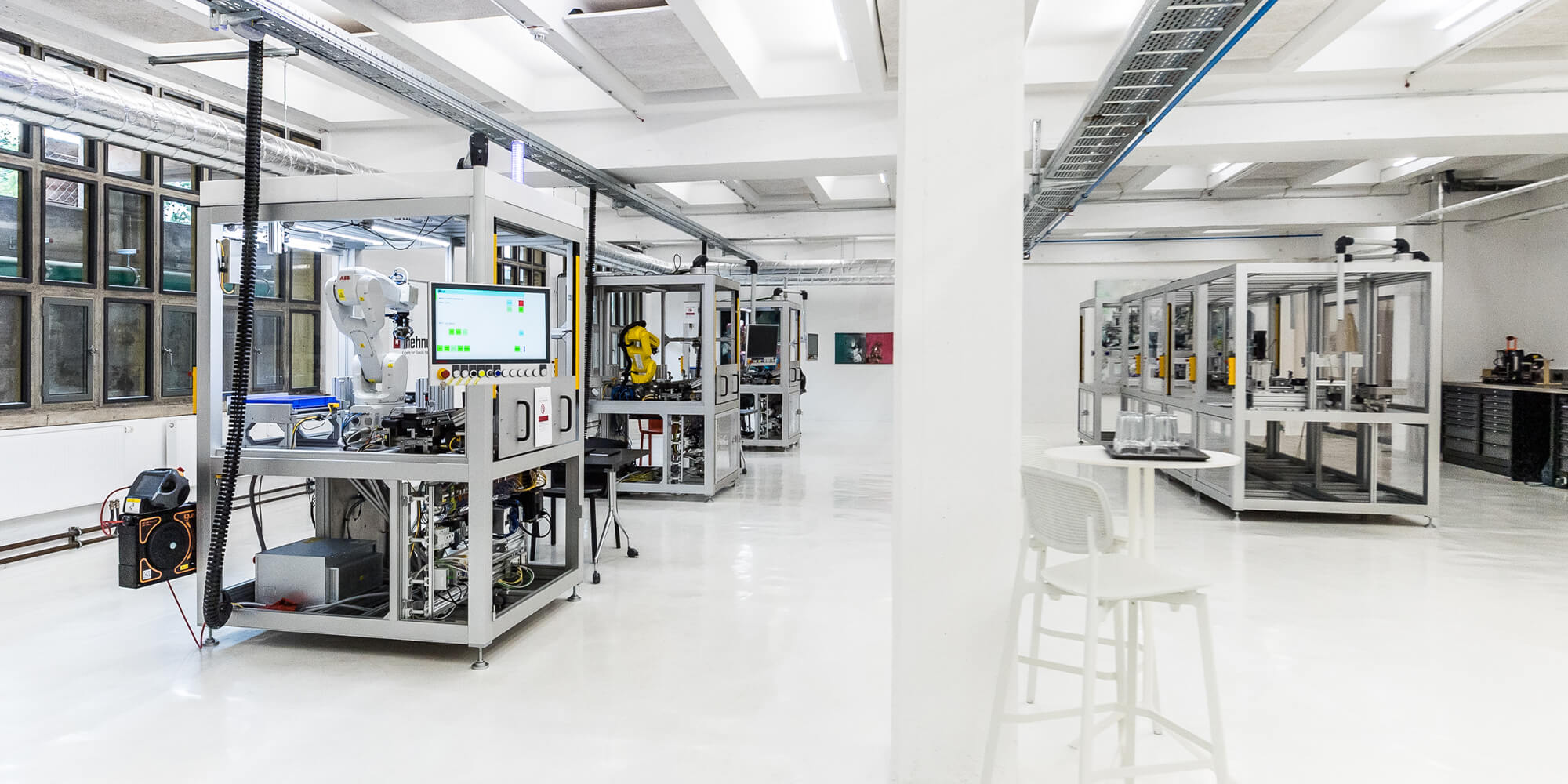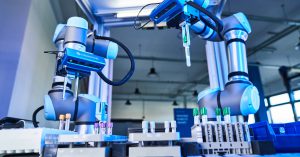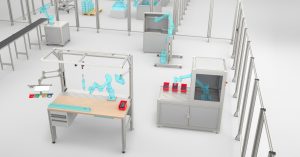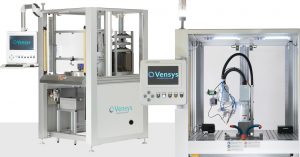item profile technology is being used for a total of eight robotic cells in the Mehnert Lab research facility.
Whether it’s a case of networking, training or research, the Mehnert Lab in Erfurt serves as a platform for interdisciplinary collaboration with a focus on Industry 4.0. A variety of machines and systems are available at the Mehnert Lab Factory premises, providing companies with ideal facilities for trying out innovative technologies for themselves and developing projects geared to a digital future. A new type of collaboration across different companies is also creating a foundation for providing workers with optimum training. When it came to equipping the research facility in a way that was aesthetically pleasing, functional and also flexible, the decision was made to use item profile technology. Eight machine cabins were constructed using the Building Kit System, which is the perfect choice for modular robotic cells and other applications that need to be customised in line with requirements. “Our cells provide a framework, but we can also expand and resize them if necessary. This means customers benefit from an ideal environment where their projects can be conducted easily and conveniently,” says Managing Director René Mehnert.
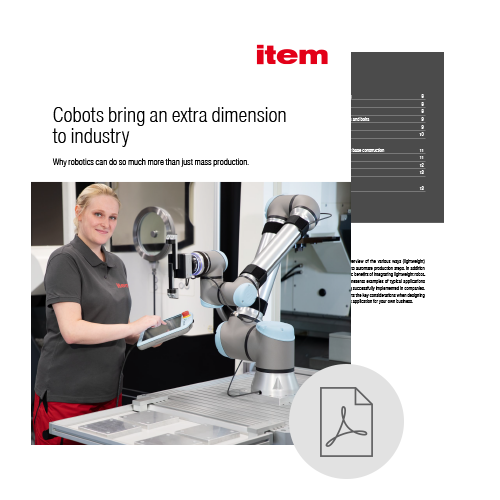
An overview of robot applications
Read our white paper to discover specific applications and other advantages of robotics in industry – and explore why lightweight robotics is a particularly worthwhile investment for small and medium-sized enterprises.
GO TO THE DOWNLOAD
How Mehnert is facilitating innovative solutions and inspiring interaction
The Mehnert Lab is operated by Mehnert GmbH, a company that deploys teams of experts and specialists worldwide for projects in the areas of electronics, mechanics, digital control, 3D metrology and robotics. It focuses on the installation, maintenance and servicing of modern industrial systems, and currently employs 55 members of staff. Besides its headquarters in Mülsen, near the German city of Zwickau, the company has a branch in Erfurt, which is also home to the Mehnert Lab. René Mehnert set up this innovation hub a few years ago: “Our goal is to see several companies work with different technologies in the lab and also benefit from each other in a way that advances their respective projects. The item components enable us to provide the perfect platform for this, while our lab opens up opportunities to share information in a dynamic setting, not to mention ideal sales opportunities.”
In addition to the elegant design and functionality of the components, I was won over by the quality, straightforward compatibility, and sheer size of the portfolio.
Besides contemporary seminar rooms and areas for events and workshops, the lab also has a 600 m2 space available for machine and system technologies. This contains a variety of robot systems and controllers. In summer 2019, René Mehnert started looking for partners to equip the lab. Specifically, what he was looking for was the ideal basis for test setups designed by an engineering firm based in Erfurt. The aim was to construct robotic cells that could be operated independently, but could also be interconnected to simulate a complete production line. The decision to opt for item was an easy one: “I was looking for a local supplier who could deliver aesthetically pleasing components that were both stable and flexible at the same time. item was an immediate contender. In addition to the elegant design and functionality of the components, I was won over by the quality, straightforward compatibility, and sheer size of the portfolio,” Mehnert emphasises.
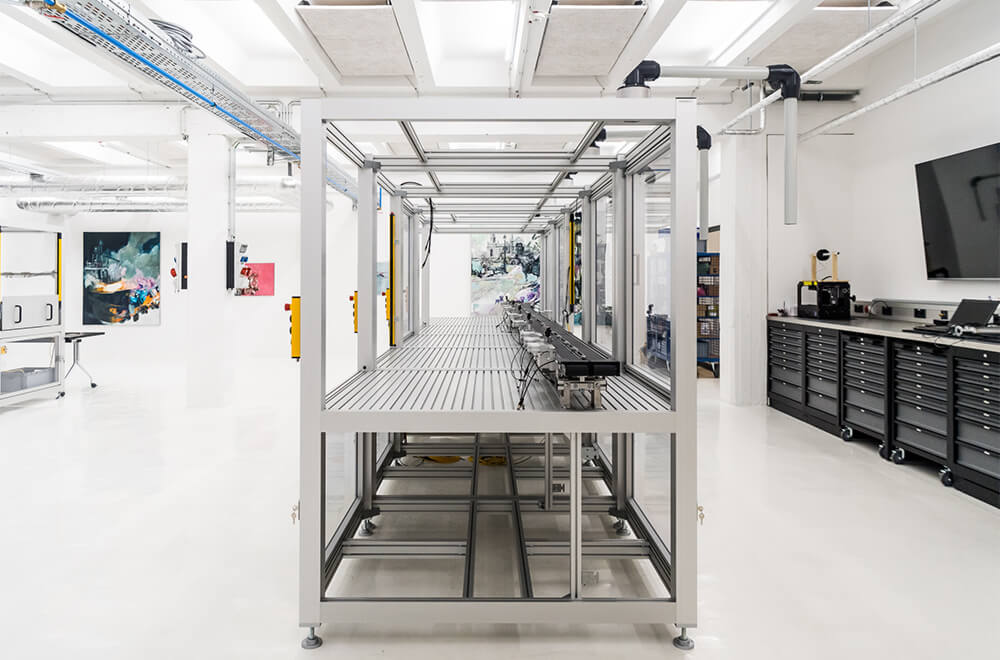
Ideal working environment thanks to flexible, modular robotic cells
The item site in Mühlhausen is only a few miles away from Erfurt and is therefore virtually on the doorstep of the Mehnert Lab. The initial draft designs for fitting out the lab were drawn up in collaboration with the engineering firm. Structures that were suited to the use of robots were created for the 600 m2 technology zone. These special robotic cells, which are available for businesses and universities to rent, contain many item components, such as Groove Plates, Robot Mounting Plates, aluminium profiles with the relevant fasteners, hinges and other accessories. “The item components lay the foundations for the straightforward integration of other systems. We created several profile-based structures, fastening options for robots, and the entire frame for the laboratory cells,” explains Steve Syhre, Project Manager at item.
The control cabinets, complete with electronics, are located in the lower section of the modular robotic cells.
Control cabinets, complete with electronics, are located in the lower section of the modular robotic cells. The control cabinet systems with doors and hatches were also built using item components. The workspaces, which can be viewed from all sides, are located on top of this and consist of a stable Groove Plate and a frame made of 80×80 mm aluminium profiles. The aim is to equip these spaces with transparent elements in the future to ensure the interior is protected and the cells can only be accessed through doors on one side. The supply lines are routed inside the pillars. The systems are operated using corresponding controllers.
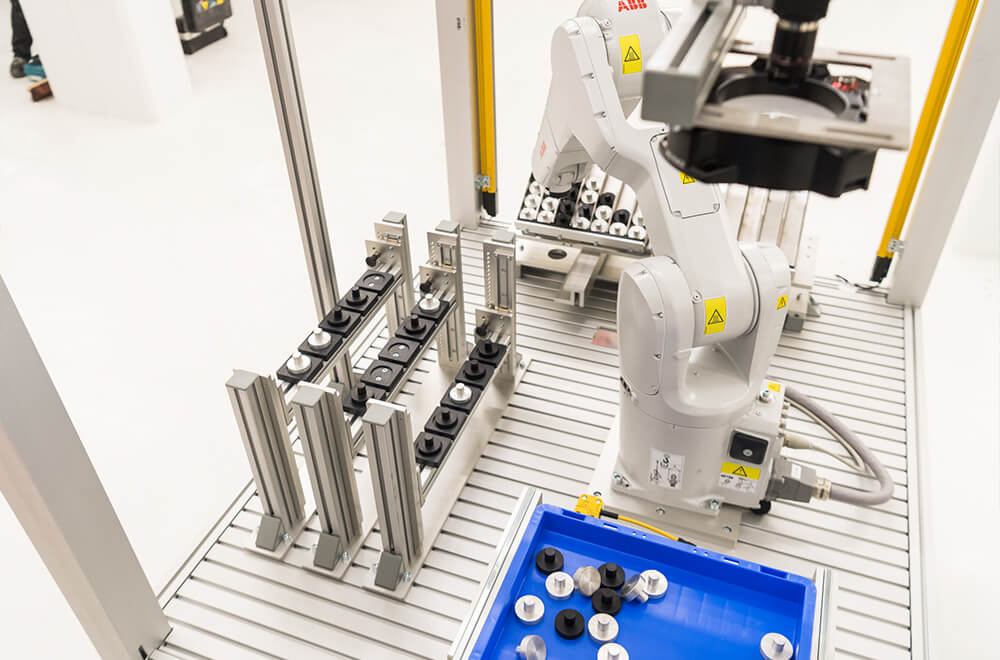
Trusting collaboration and ideas for new projects
While item and the engineering firm were responsible for planning, the Mehnert staff were in charge of cutting the components to size and assembling the modular robotic cells. During this process, they became very familiar with the broad range of products and services offered by item and also made use of the free item online configurators for various tasks. Mehnert has every confidence in the extensive item portfolio that comprises more than 4500 components and is constantly being expanded to include new innovations. “The clear advantage of the components is just how quickly they can be assembled and disassembled. Constructions made from welded profiles do not offer this level of flexibility,” says Mehnert. The end-to-end modularity means it is also possible to combine older profiles with new ones.
We greatly value the partnership and the intensive support item provides. item was always on hand to give us advice and practical assistance.
Another benefit of the profiles is that they are future-proof. As Mehnert explains, the item design philosophy plays an important role in this respect: “It means, for example, that you don’t need to change product ranges every five years. Thanks to the smooth surface and elegant design of the aluminium profiles, our constructions will still look completely cohesive 30 years from now.” Mehnert and item worked together closely throughout the project. “We greatly value the partnership and the intensive support item provides. item was always on hand to give us advice and practical assistance. This meant we always found a solution quickly, even in tricky situations,” says the Managing Director. Work to complete the modular robotic cells is currently still ongoing, but there are already plans in the pipeline to continue the collaboration in the future. For example, there might be an opportunity to introduce other components from the areas of lean production or ergonomic workplace design. “We see the Mehnert Lab as a permanent exhibition where companies can showcase their products and innovations. It’s a bit like a trade fair that is held 365 days a year,” explains Mehnert.
Want all the latest updates on innovative robotics applications? Simply subscribe to the item blog by completing the box at the top right.

